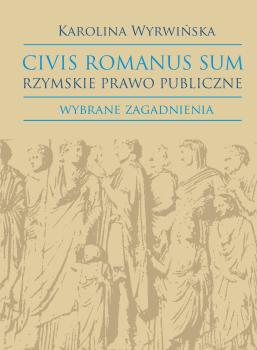Civis Romanus sum. Rzymskie prawo publiczne : wybrane zagadnienia
Słowa kluczowe:
obywatelstwo rzymskie, republika rzymskaStreszczenie
CIVIS ROMANUS SUM. THE ROMAN PUBLIC LAW – SELECTED ISSUES
The present book Civis Romanus sum. The Roman public law – selected issues has been planned as a scientific support for students of Administration at the Faculty of Law and Administration of Jagiellonian University, for auditors of lectures: The Roman administrative practice and The Roman system and administration in a comparative context. The book is a set of essays concerning issues of Roman public law. Some aspects of the Roman public law and subject matters to which a Roman citizenship (civitas Romana) is a common denominator, have been raised herein. The concept of citizenship itself and its importance to Romans and strangers and also the content of rights included in it are extraordinarily interesting and very complex issues. They have been a subject of many scientific works: monographs, articles and handbooks of the Roman public law. This publication is not a handbook in principle and therefore, having freedom (to some extent) of choosing issues to be analysed, I decided to select these which concern the purchase and loss of Roman citizenship, rights entitled to citizens pursuant to the private and public law and a way of realisation of one of these rights – the right to stand for office (ius honorum). Discussing the latter issue required a presentation of process of creating the structure of Roman offices in a period of Republic and either the basis of rules concerning holding offices and indication of competences of particular magistratus. Thus, as Cicero wrote “the office is the power” (Cic. de leg. 3.1.2: For as the law is set over the magistrate, even so are the magistrates set over the people) – holding an office was incredibly prestigious in Rome. It is worth paying the attention to pre-election campaign, looking at a candidate’s profile, discussing the challenges which a candidate had to rise to and indicating which pre- -electoral candidate’s activity was considered to be advantageous or condemnable at the end of the Republic.
Rozdziały
-
TABLE OF CONTENTS
-
Wstęp .......... 7
-
I. O OBYWATELSTWIE RZYMSKIM .......... 9
-
Uprawnienia i obowiązki obywatela rzymskiego .......... 12
-
Uprawnienia obywatela rzymskiego w sferze prawa prywatnego .......... 13
-
Uprawnienia i obowiązki obywatela rzymskiego w sferze prawa publicznego .......... 26
-
Kwestia civitas sine suffragio .......... 48
-
Nabycie obywatelstwa rzymskiego .......... 51
-
Kwestia „podwójnego” obywatelstwa .......... 68
-
Utrata obywatelstwa rzymskiego .......... 70
-
Prawo powrotu (postliminium) .......... 74
-
Wybrana literatura do rozdziału pierwszego .......... 75
-
II. O URZĘDACH RZYMSKICH W OKRESIE REPUBLIKI .......... 79
-
Konsulowie (consules) .......... 84
-
Dyktator (dictator) .......... 92
-
Dowódca jazdy (magister equitum) .......... 99
-
Trybuni plebejscy (tribuni plebis) .......... 100
-
Edylowie plebejscy (aediles plebis) .......... 109
-
Kwestorzy (quaestores) .......... 111
-
Trybuni wojskowi z władzą konsularną (tribuni militum consulari potestate) .......... 116
-
Cenzorzy (censores) .......... 119
-
Pretorzy (praetores) .......... 128
-
Edylowie kurulni (aediles curules) .......... 134
-
Vigintisexviri .......... 139
-
Wybrana literatura do rozdziału drugiego .......... 141
-
III. O WYMOGACH STAWIANYCH KANDYDATOM NA URZĘDY ORAZ O PRZEBIEGU KAMPANII WYBORCZEJ W OKRESIE REPUBLIKI RZYMSKIEJ .......... 145
-
Kandydat (candidatus) .......... 146
-
Oficjalne zgłoszenie kandydatury (professio) .......... 149
-
Prowadzenie kampanii wyborczej (petitio) .......... 150
-
Wybrana literatura do rozdziału trzeciego .......... 157
-
IV. O CURSUS HONORUM .......... 159
-
Wybrana literatura do rozdziału czwartego .......... 167
-
Wykaz skrótów .......... 169
-
Bibliografia .......... 171
-
Indeks pojęć łacińskich .......... 181
-
Indeks źródeł .......... 187
Downloads
Bibliografia





